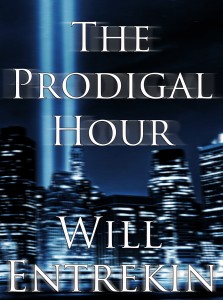A Guest Blog Post from Will Entrekin
Today’s guest blog post is from the amazingly talented Will Entrekin.
You may recall that awhile back I reviewed his novel Meets Girl, as well as interviewed him. Since then, we’ve kept in touch. At one point I mentioned to him I would love for him to write up a guest blog post for my site once the release date for The Prodigal Hour, his forthcoming novel, drew closer. Well, that day is just around the corner, so Will dropped me an email yesterday with this lovely post. If you enjoy what he has to say, I strongly suggest you stop by his site. I do on a regular basis.
I must note that I’m not sure why he panicked when I asked him to contribute my site. I think he has a brilliant mind and a wonderful way with words, so he’s welcome here at any time.
So without further ado, here’s Will!
*
When Nikki asked me to do an interview with her, I leapt at the opportunity. When she asked after a guest post, though, I panicked a bit, like I generally do, because there’s so much to write about I never know where to begin. But then I thought of a couple of questions she had asked me that had made me pause: what has been most rewarding to me as an author, and what has been the greatest challenge? I thought this would be a good opportunity to elaborate on my responses to those questions, because they’re the ones I’ve been most concerned with as I’ve grown into independence.
For authors, independence is yet a tricky beast. We still live in a culture of writing and publishing that values contracts with corporations as among the hallmarks of legitimacy–and often, such a contract is required for consideration for various prizes and awards. Oddly, this seems to be demanded mainly by the major genre associations, including the MWA, the SFWA, and the RWA. One would think that the science fiction culture, which is all about spaceships and other worlds and the future and technology, would be quick to embrace new methods and modes, but such is sadly not the case. So far as I can tell, the Magazine of Fantasy and Science Fiction still requires submissions on the pulp of dead trees, which seems utterly backward.
In practice, these requirements are often an attempt at either maintaining or in some cases creating a hierarchy. Genre has rarely been held in similar regard to what many would call “literary fiction”–consider the quality of fiction for Chandler and Hammett and King and then their reputation when regarded next to Fitzgerald’s or Faulkner’s or Delillo’s. But independence gives genre authors colleagues to sneer about.
Many independent authors counter this with a sales defense. Joe Konrath, for one, has become known as something of an advocate for what he calls “self-publishing” (a term I dislike and tend to avoid except when other people use it. There’s a lot of power in words. Witness popular support for “the public option” but not “government-mandated universal health insurance” during those healthcare debates despite that both are the same thing). His blog is a regular fount of knowledge regarding publishing, formatting, marketing, and other considerations with which indie authors must concern themselves–and a must read. He also tends to talk regularly about his sales.
Now, don’t take me wrong: I admire his transparency, and even appreciate it. It’s great to know the figures, and even greater when he talks about his royalties and experiments with pricing.
On the other hand, Konrath is pretty clearly what Malcom Gladwell would call an outlier–an exceptional example on an outside end of a success curve. I’d say most independent authors will never achieve that level of success, but the truth is that most authors in general–no matter their method of distribution and who is behind it (which is pretty much what publishing ultimately comes down to)–never achieve that sort of success either. (Here there is probably an argument about whether it’s easier for an author published by a corporation to achieve that success. I think the answer is probably, but not by much.)
And on the other other hand, I fear that discussion of sales figures is employed as a way to counter the contempt with which so many regard indie authors. Even authors who got their start with what they call “self-publishing”–and who subsequently went on to sign with corporations–deride authors who call themselves independent, imploring us to “own” self-publishing. (To which my response was, fine. I own it. Now I’m going to rethink it, recondition it, rebrand it, remarket it, repackage it, and rebuild it from the ground up, and I’m going to call it independent publishing, thank you very much. It’s also worth noting most of the authors and publishing professionals who propagate this mindset are tied in some concrete ways to corporate publishing.)
And on the other other other hand–well, this part’s personal, but I was raised that discussions of money and finances is personal business and not meant for polite company. I don’t see doctors or lawyers–or editors or agents, for that matter–tending to discuss things like salaries (though I suppose we do generally know that a standard contract nets literary agents fifteen percent of an author’s income from the sales the agents brokered).
I think part of it, too, is my personal movement away from that ultimate goal of a publication contract with a corporation. For years, it was all I wanted. I was concerned about the quality of my writing only insofar as it was a means to that publication goal. I wanted a book deal. I wanted a six-figure advance and royalties. I wanted to call myself an author.
That last part there was, for so long, contingent on the others, if only because corporations were the only real way to distribution that didn’t involve door-to-door sales and a stack of “vanity” books in your garage. Things aren’t that way anymore. Nowadays, writers can write a good book, and then start Twitter and blog accounts to network and connect their work with people. Some connect more successfully, more deeply, or more widely than others, but the reason I’m discussing all this is that, at least for me, my own personal and professional challenge for the past several years has been to focus more on the “write a good book” part of things, which I fear is so often neglected by authors and corporations alike. I used to post something and follow blog views and subscribers, retweets and followers, friends and likes.
My goal right now is not so much to forget those things but to get back to that first part. To write good stories and connect with people. Like I’ve connected with Nikki, for example.
I don’t know how people will respond to The Prodigal Hour. It’s a big, bold, epic time-travel adventure story that’s the world’s first pre-/post-9/11 novel, and it concerns faith and grief and love and loss, and it’s got a huge cast of characters that includes historical figures (it’s got time travel in it, after all), not to mention key historical events in locales both temporally and geographically exotic. I don’t know how many copies it will sell. Probably not many at first, because while I’ve been concentrated on writing a better book, I’ve also very much neglected my online presence–that oft-mentioned platform so necessary nowadays.
But the thing is, I’m proud of it. I think it’s my best book so far, and it’s certainly my most ambitious. I hope it does well–extraordinarily, egregiously well–but my real hope is that I remain as pleased as I am with it regardless of its reception.
*
On a slight side note, keep an eye out for my review of The Prodigal Hour. Will was kind of enough to send me an advanced copy of it. I’m thoroughly enjoying it, and I can’t wait to see how it ends.



Paul @ Office Shopping says:
Looks very controversial and I love mystery and enlightenment. I will definitely get a copy of it and get back on this post and share my thoughts to everyone. Thanks Nikki 🙂
Acadia
Twitter: acadia
says:
Time travel is risky. Well, writing about it is. Actually doing it is surprisingly simple. Good luck with the book!
Will Entrekin
Twitter: willentrekin
says:
Paul: Thanks. I think those were the two elements I was most aiming at. Look forward to hearing what you think.
Acadia: You’re totally right. The few times I queried it I got responses like “It’s a great idea, and you’re a good writer, but time travel is a difficult market.” Which is partly why I wonder about reception; if it’s difficult, I may not crack it. That’s what editors are paid to know, after all. But thanks for the wishes. Here’s hoping!
Nikki says:
I do believe this is the nicest comment I’ve ever seen you post. I’d pat you on the back, but I’d probably hurt it.
Nikki says:
Have faith, Will. I love stories like this, and I know I’m not the only one. And don’t you worry. When it’s available for purchase, I’ll pimp the hell out of it for you.
Alegra Clarke says:
“My goal right now is not so much to forget those things but to get back to that first part. To write good stories and connect with people.”
Huzzah!
I’m of the belief that everything else comes from this focus. At least for me, all opportunities and publications have come most easily when I’ve anchored myself in this primary motivation.